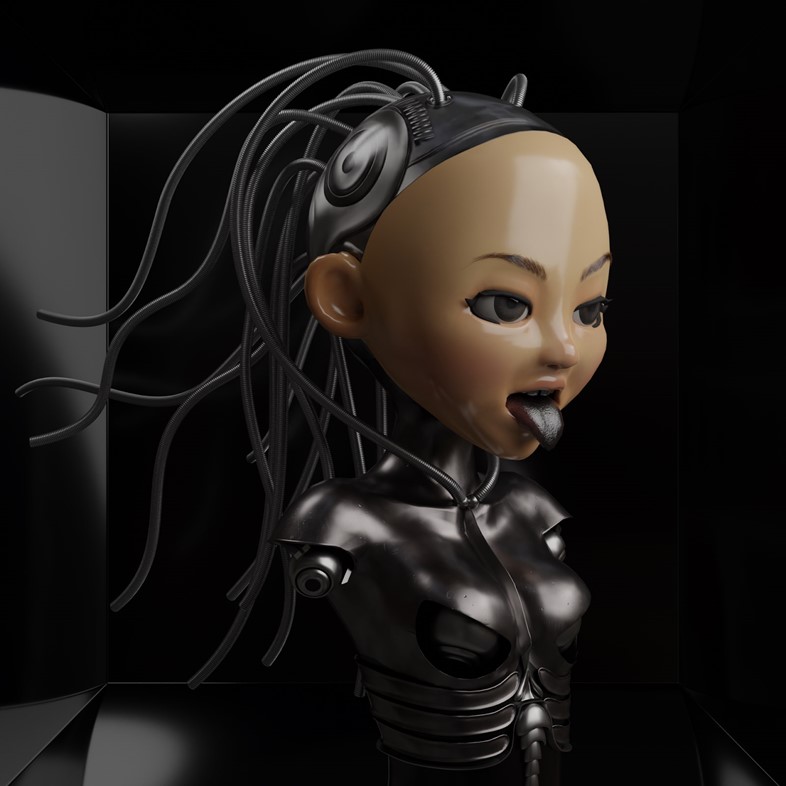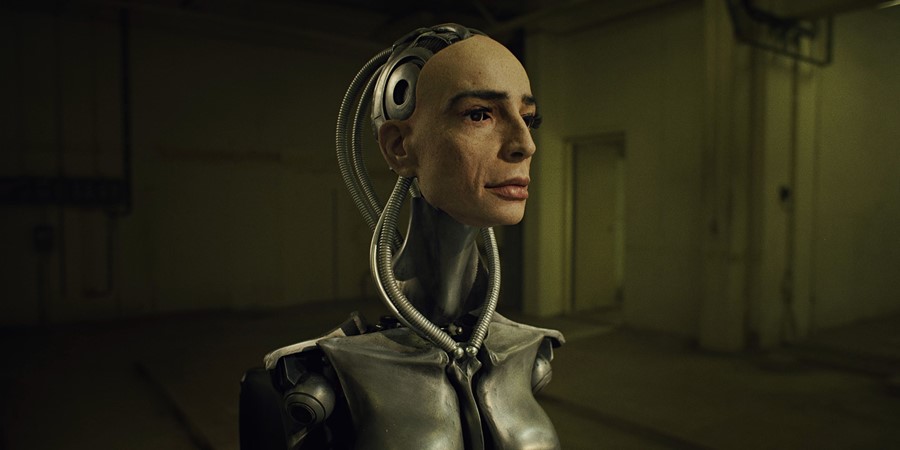The musician’s robot counterpart, Dahlia, has become the first AI artist pioneered by the ‘artist-centric’ music platform Myvox
In April this year, a TikToker named @ghostwriter977 released a song with AI-generated vocals made to sound like Drake and The Weeknd, which accumulated millions of listens before it was pulled from streaming services by Universal Music Group. On social media, Drake himself has denounced similar AI imitations, while others have called them “demonic” or dismissed them as theft (though the actual legal implications are still blurry).
For some time now, Grimes has also been experimenting with AI-generated alter egos, from interacting with a Twitter account trained on her own thoughts, to launching her own, AI-powered girl group. In May 2023, though, she took the biggest step yet, inviting fans to deepfake her voice for use in their own songs via a dedicated website, Elf.Tech. The idea, she explained at the time, was to make her musical persona “open source and self replicating” while maintaining a level of ownership – as such, she splits 50 per cent royalties on any successful tracks.
Drake and Grimes have essentially laid out two different approaches to the dawn of AI music: one is pushing back against the new technology using existing frameworks like copyright law, and the other is taking a more optimistic approach, envisioning a future where the tech enables new kinds of collaboration and creativity. Taking the latter approach, Grimes may be outnumbered (for the time being) but she isn’t alone. Just yesterday (August 14), the Iranian-Dutch singer and Dazed 100 alum Sevdaliza announced a new collaboration with Myvox, opening up access to her own AI voice model, Dahlia.
Built around the “femenoid robot” that Sevdaliza first introduced in an “OH MY GOD” music video last year, and expanded on in the eponymous EP Raving Dahlia, the AI model enables creators to transform their vocals into Dahlia’s, and release the resulting tracks on all streaming platforms. Like Grimes, Sevdaliza will receive a 50 per cent split of all royalties.
Sevdaliza initially started conversations with Myvox after tweeting about the prospects of developing an AI voice model. “Someone from Myvox reached out to me and we started exploring,” she tells Dazed, noting that she was excited by the “endless options” for creativity and collaboration, and is already looking forward to hearing the creations made by other minds harnessing her unique voice.
Dahlia was a natural fit as Myvox’s first AI artist, say the two co-founders of the music creation platform, independent musicians Maeve (Arianna Broderick) and John Clancy, adding that the collaboration emerged from a “genuine appreciation” of Sevdaliza’s talents. Embodied in a physical robot made of metal, plastic, and silicones, the integration of AI technology is also a logical next step for the musical persona herself.
“They complement each other because Dahlia is a sentient being,” Sevdaliza explains. “She is a living, existing creature and she has her own beliefs, her own vocabulary, her own preferences. Myvox basically allows people to imagine who Dahlia is, instead of Dahlia imagining herself.” The musician adds that she’s been using AI – ranging from plugins to Ableton’s built-in tools – for a very long time, to create music and visuals that wouldn’t be possible with purely analog tools. “I use it for every aspect in my creative process,” she says. “So for me, it was not really a big step to create an AI voice model.”
That doesn’t mean that AI won’t have revolutionary effects on the wider music industry, of course. From the bland, featureless landscape of AI-generated muzak, to the virtual resurrection of dead musicians, to the genuinely interesting experiments by musicians like patten, the effects are already being felt. As Sevdaliza notes, the voice in particular is a “very personal, intimate instrument” – it’s understandable that singers would want to safeguard theirs from imitation or, at worst, exploitation.
For Myvox, this is all part of the project. “We embody an artist-centric philosophy,” explain its founders, “empowering creators to harness AI tools while maintaining creative control.” Essentially, what this means is enabling artists to create their own vocal models and maintain control of licensing. That way, any talented producers and songwriters that might use them – especially those who can’t afford expensive studios and session vocalists – are automatically “collaborating” with the artist instead of sourcing their voice from a third party, without their permission.
“As we know with any new technological advancements, legal framework must evolve to offer safeguards for artists,” say Maeve and Clancy, on this aspect of AI music generation. “It’s extremely concerning to see artists’ likeness and voices imitated without consent and we make sure that with whatever we do on Myvox the artists come first.” On the other hand, they add that copyright laws need to be adapted and updated to reflect emerging tools for music creation and distribution, the way they were when other media like sheet music and sampling were first introduced. “Finding the right balance between safeguarding copyright, protecting IP, and fostering creative innovation is crucial.”

Sevdaliza agrees that all new technological developments should come with a degree of risk assessment, noting that AI tools pose a danger to society beyond mere music creation. She does say, however, that she’s not afraid of being replaced by robot musicians. “[Humans] will always search for creative outlets,” she says, adding: “Emotion is a crucial element, therefore I don’t think the creative process will be fully replaced by AI. I think that the vision and the perseverance will separate the real from the lie.”
On the plus side, Sevdaliza suggests, AI could actually add to human creativity more than it takes away, since democratising access to tools and information is a vital part of opening up the music-making process. “If it wasn’t for democracy, I would never [have] been a musician because I didn’t study music and I’m an autodidact,” she says. “I learned everything I know off the internet. So if I’m not [supporting] this, then I’m definitely a hypocrite.”
Even established artists might increasingly find themselves engaging with AI tools, as they begin to open up new sonic possibilities the way electric guitars, synthesisers, or DAWs did before them, or even just streamline the creative process. “Artists can use their own AI voice models to explore artistic directions without constraints to time and studios,” the Myvox founders suggest. “There is also an archival benefit in capturing your voice in a specific moment in time and preserving it forever.”
“I see it as a moodboard,” says Sevdaliza, who has also experimented with ChatGPT and Midjourney to make art. “You pick and choose certain ideas, and you can place them on your moodboard and see what suits the song you have in mind. It’s definitely interesting to explore.”
Myvox’s Dahlia model launched August 14, and is available to use here. The first official Dahlia track is scheduled to be released on August 24.
Join Dazed Club and be part of our world! You get exclusive access to events, parties, festivals and our editors, as well as a free subscription to Dazed for a year. Join for £5/month today.




